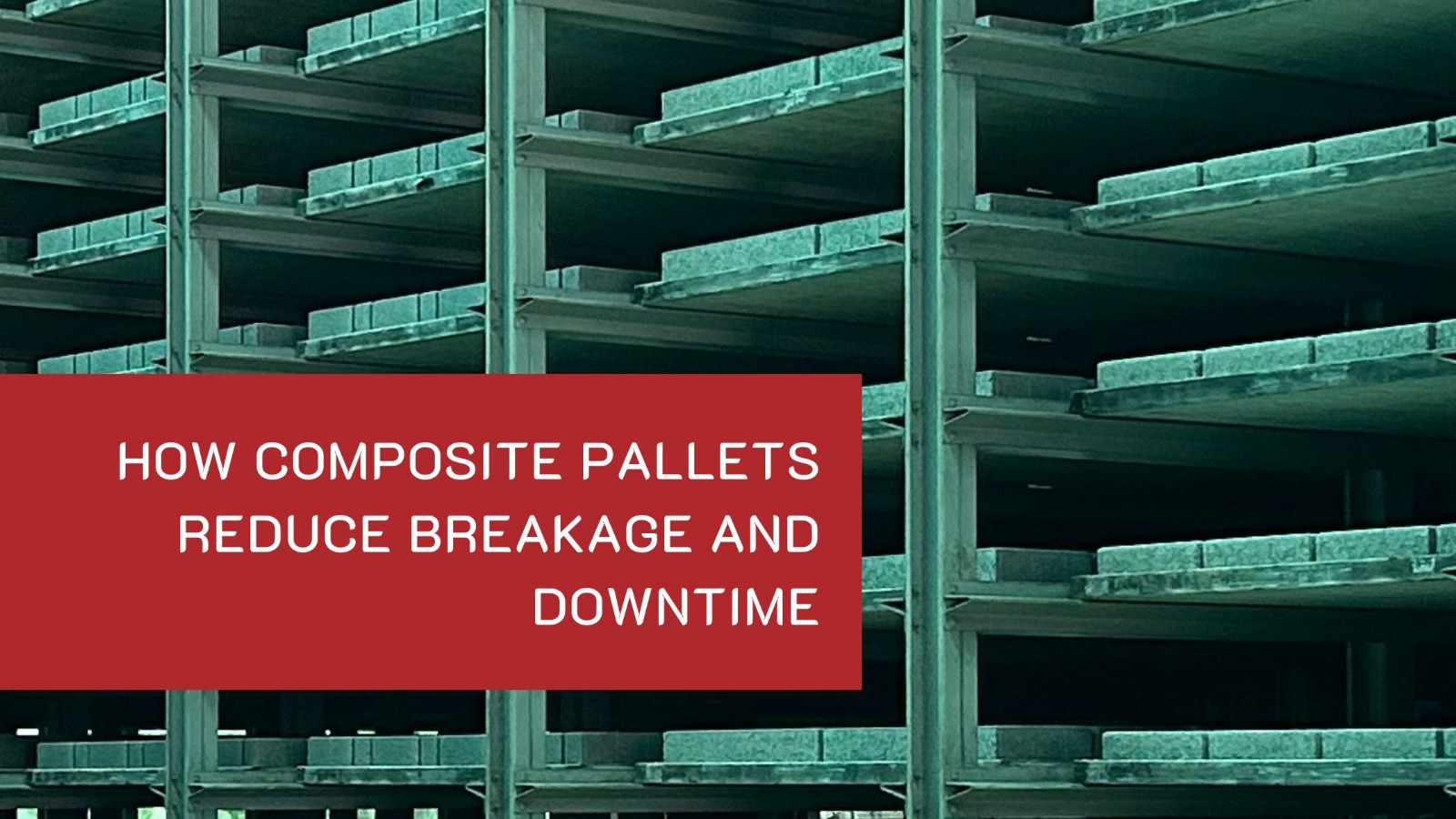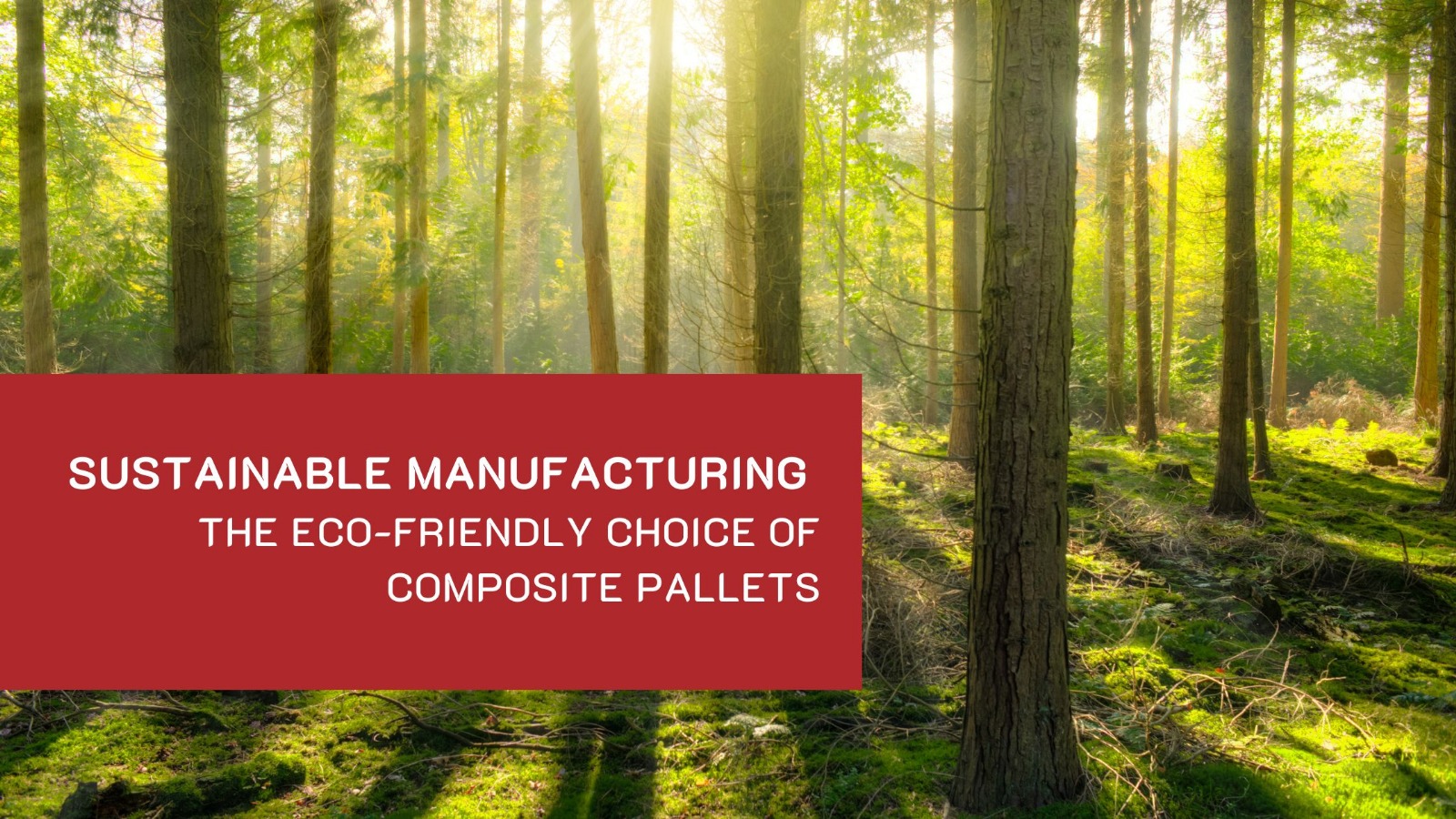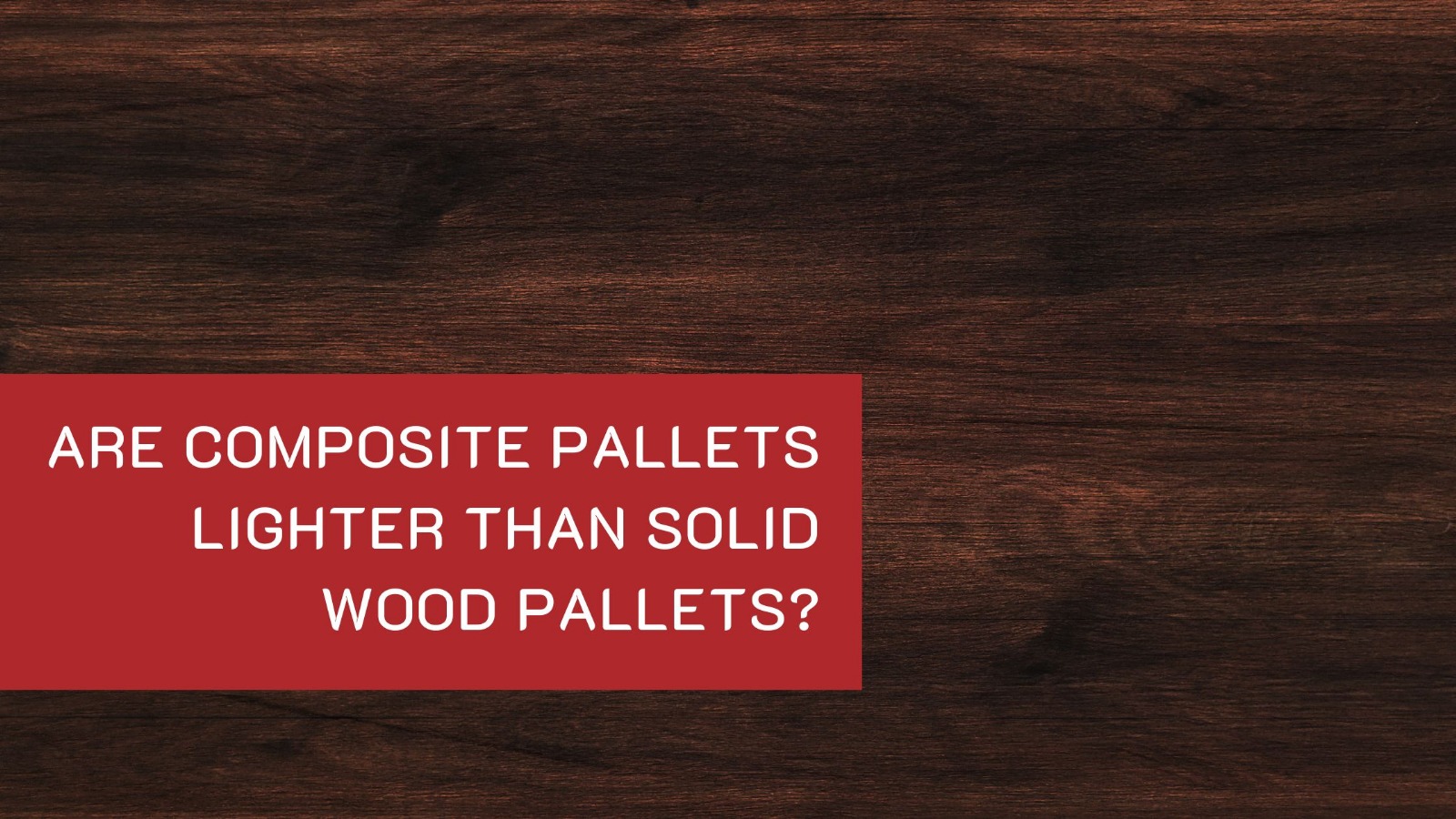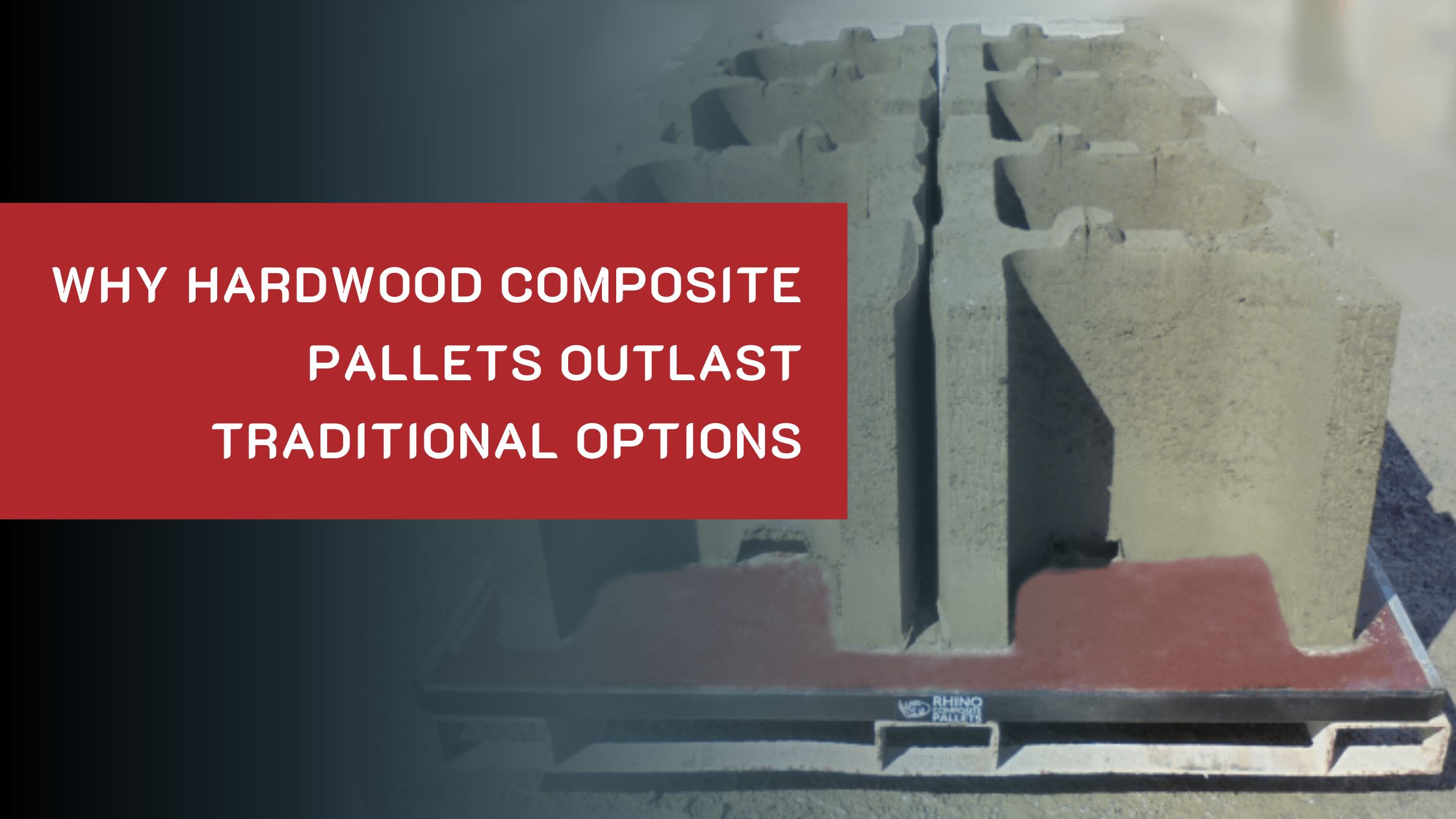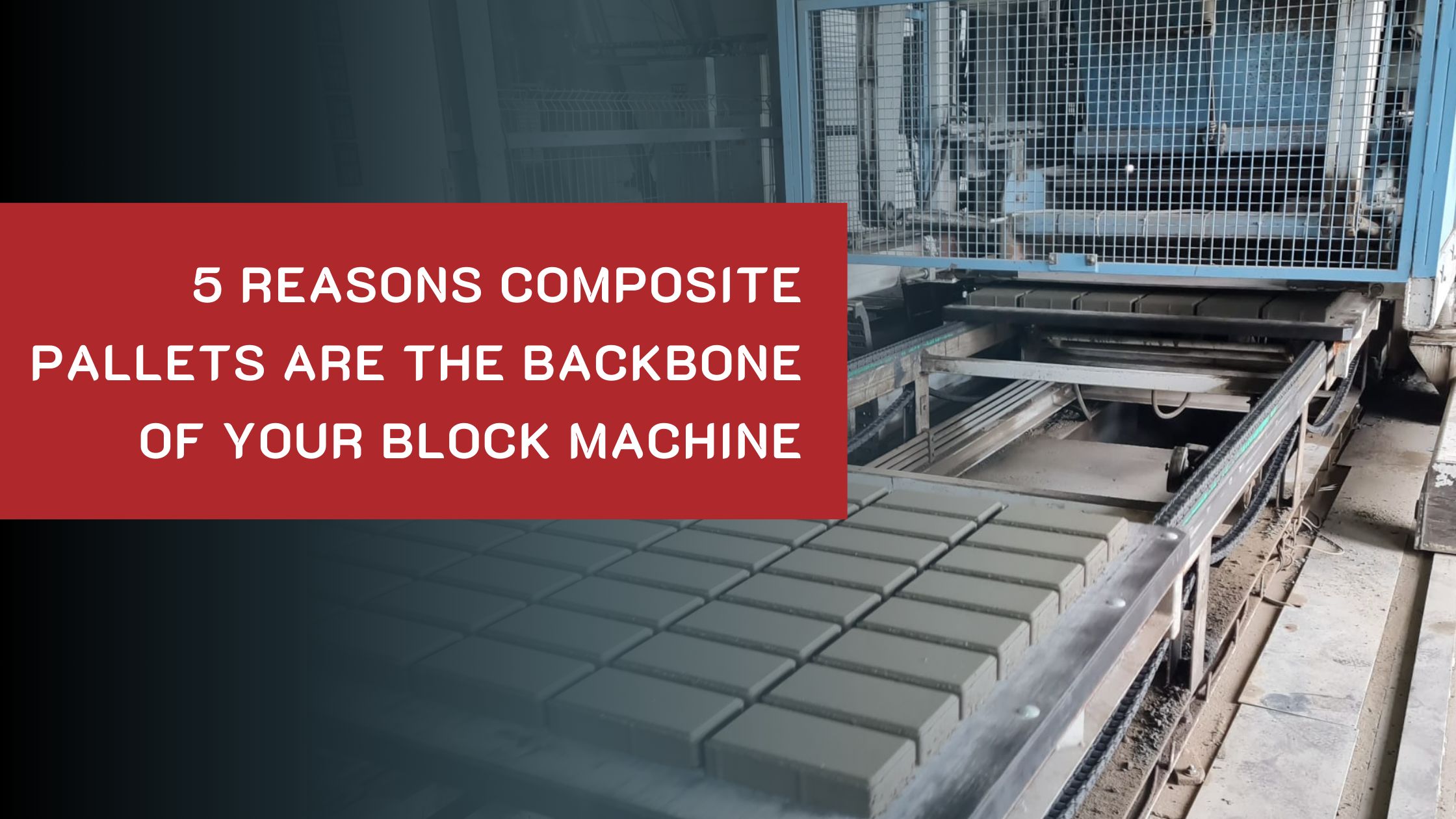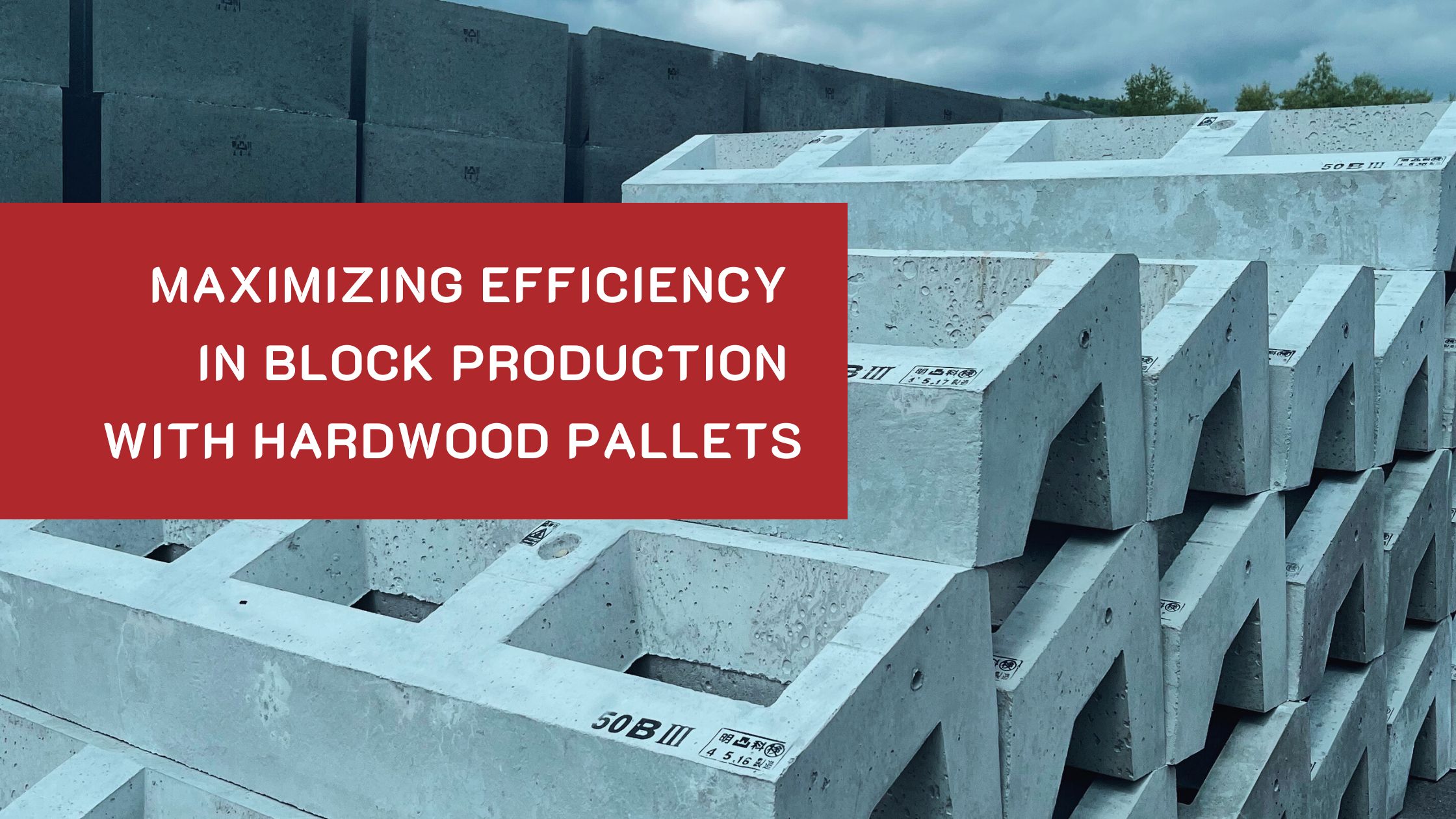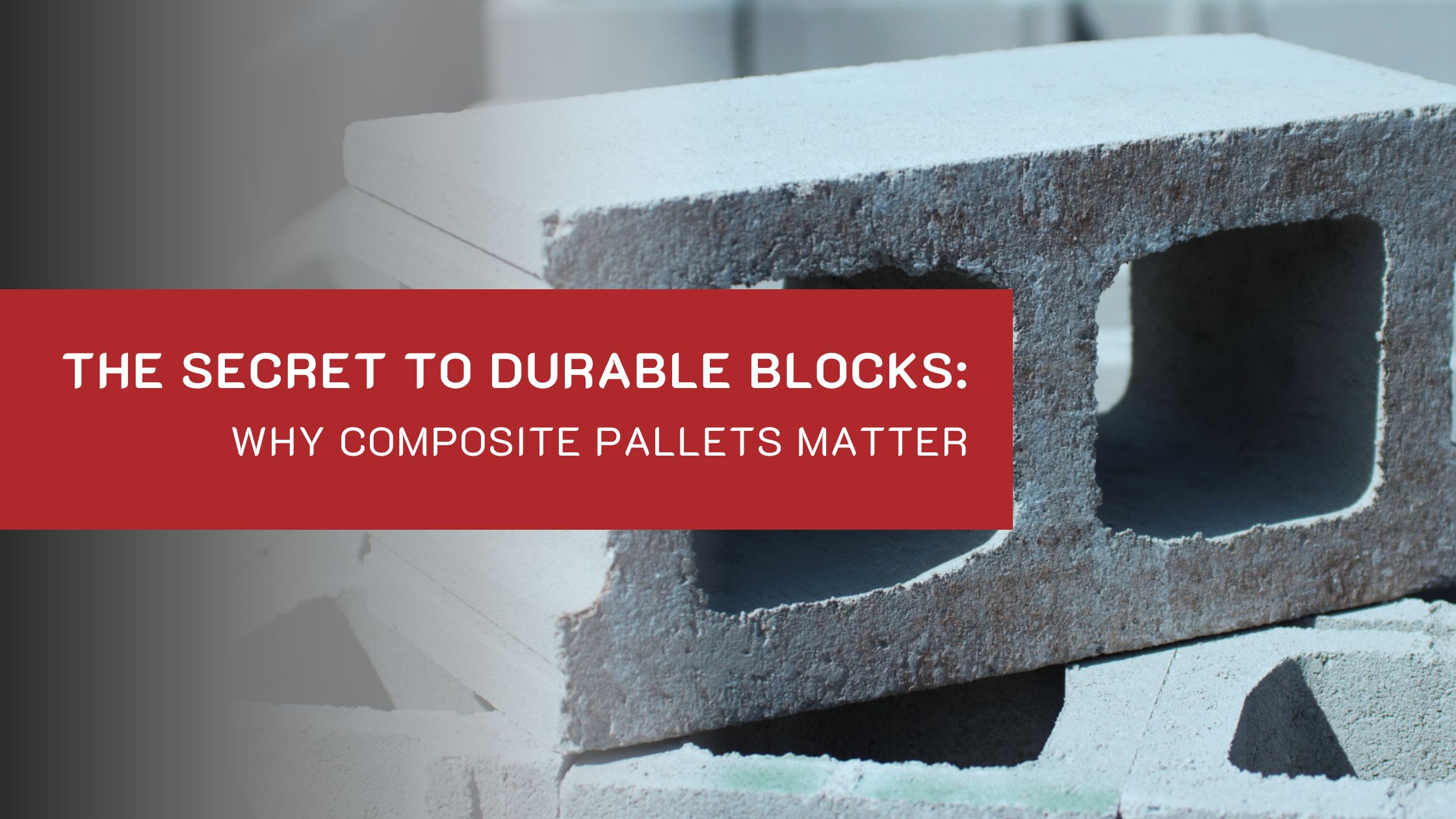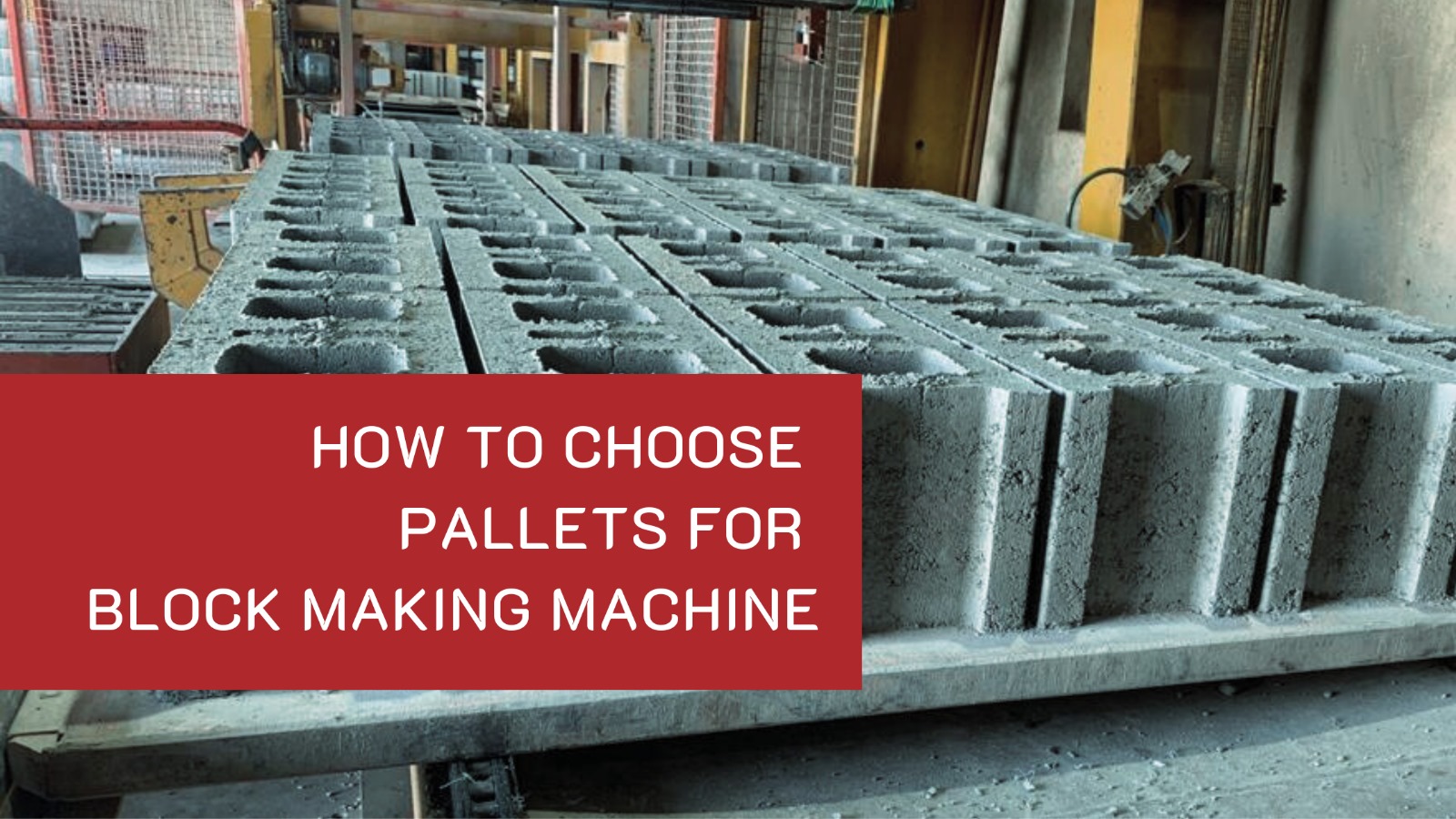How Composite Pallets Reduce Breakage and Downtime
How Composite Pallets Reduce Breakage and Downtime Home How Composite Pallets Reduce Breakage and Downtime Introduction For manufacturers, efficiency is everything. When equipment or materials fail, it leads to downtime, lost productivity, and increased costs. One of the biggest contributors to inefficiency in block manufacturing is pallet breakage. Traditional wooden and steel pallets often wear out quickly, leading to frequent replacements and production interruptions. This is where composite pallets step in to change the game. In this blog, we’ll explore how composite pallets, like Rhino Composite Pallets, significantly reduce breakage and downtime, ensuring smoother operations and higher productivity. Why Do Traditional Pallets Break? Before we get into the advantages of composite pallets, let’s look at the issues with conventional ones: 1. Wooden Pallets: Fragile and High-Maintenance Wooden pallets are prone to cracking, splintering, and warping. Exposure to moisture and humidity weakens their structure. They require frequent repairs or replacements, causing unnecessary downtime. 2. Steel Pallets: Strong but Problematic Steel pallets are durable but susceptible to rust and corrosion. They are heavy and difficult to handle, increasing labor costs. Over time, they may bend under high loads, reducing efficiency. These issues highlight the need for a more durable and long-lasting solution—composite pallets. How Composite Pallets Reduce Breakage 1. Superior Durability and Strength Composite pallets are engineered from high-quality polymer and fiber composites, making them extremely strong and impact-resistant. Unlike wood, they don’t splinter or crack under pressure, and unlike steel, they don’t rust or corrode. 2. Moisture and Chemical Resistance Moisture is a major cause of pallet degradation. Composite pallets are waterproof and resistant to chemicals, ensuring they maintain their structural integrity even in harsh conditions. 3. No Warping or Deformation Over time, wooden pallets warp due to temperature and moisture changes. Composite pallets remain dimensionally stable, providing a reliable surface for block manufacturing. 4. Withstands Heavy Loads Composite pallets are designed to handle heavy weights without bending or breaking. This makes them ideal for block manufacturing, where durability is crucial. How Composite Pallets Minimize Downtime 1. Reduced Replacement Frequency Since composite pallets last significantly longer than wood or steel, manufacturers don’t need to replace them as often. This minimizes interruptions in production. 2. Less Maintenance Required With traditional pallets, frequent maintenance is necessary to repair damage. Composite pallets require little to no maintenance, keeping the workflow uninterrupted. 3. Lightweight and Easy to Handle Unlike steel pallets, composite pallets are lightweight yet strong, making them easier to move and reducing labor efforts. This speeds up material handling and increases efficiency. 4. Consistent Quality for Automated Systems Many modern manufacturing plants use automated machinery for block production. Uneven or broken pallets can cause delays and errors in the automation process. Composite pallets ensure consistent quality, allowing smooth operation with minimal human intervention. Why Rhino Composite Pallets Are the Best Choice Rhino Composite Pallets take all these benefits to the next level. Their long lifespan, strength, and resistance to environmental factors make them an ideal choice for manufacturers looking to boost productivity. Key Benefits: Extremely durable and impact-resistant No warping, cracking, or rotting Lightweight for easy handling Water, chemical, and pest resistant Reduces overall downtime and increases efficiency Conclusion Pallet breakage and downtime are two major concerns in block manufacturing. By switching to composite pallets, manufacturers can significantly reduce operational disruptions, improve efficiency, and save costs in the long run. Rhino Composite Pallets provide a durable, reliable, and eco-friendly solution that ensures a smoother and more productive workflow. If you’re tired of dealing with frequent pallet failures and costly downtime, it’s time to switch to Rhino Composite Pallets. Get in touch today to learn how these advanced pallets can revolutionize your production process!
Read MoreSustainable Block Manufacturing: The Eco-Friendly Choice of Rhino Composite Pallets
Sustainable Manufacturing: The Eco-Friendly Choice of Composite Pallets Home Sustainable Block Manufacturing: The Eco-Friendly Choice of Rhino Composite Pallets Introduction Sustainability is the buzzword in almost every industry today, and the construction sector is no exception. With increasing environmental concerns, businesses are actively looking for eco-friendly solutions. One such innovation is Rhino Composite Pallets, which are revolutionizing the way concrete blocks are manufactured. These pallets offer a sustainable, durable, and cost-effective alternative to traditional wooden or steel pallets. In this blog, we’ll explore how Rhino Composite Pallets contribute to sustainable block manufacturing, their benefits, and why they’re the best choice for modern block-making businesses. The Problem with Traditional Pallets Before we get into the benefits of Rhino Composite Pallets, let’s first look at the issues with conventional options: 1. Wooden Pallets – Not So Green Wooden pallets are widely used, but they come at a cost – deforestation. They are susceptible to moisture damage, warping, and breakage, leading to frequent replacements. Over time, the continuous need for replacements increases waste and environmental impact. 2. Steel Pallets – Durable but Expensive Steel pallets are strong but prone to rusting, especially in humid conditions. They are heavy, making them difficult to transport and handle. The manufacturing process of steel involves high energy consumption and carbon emissions. With these challenges, manufacturers need a sustainable and long-lasting alternative—enter Rhino Composite Pallets! What Are Rhino Composite Pallets? Rhino Composite Pallets are engineered from a blend of composite materials, offering superior durability, strength, and eco-friendliness. Unlike traditional pallets, these are designed to withstand the demanding environment of block manufacturing while also promoting sustainability. Key Features: 100% recyclable materials Water-resistant and warp-proof High impact resistance Lightweight yet extremely strong Longer lifespan compared to wood and steel pallets Now, let’s break down how these pallets contribute to sustainable block manufacturing. How Rhino Composite Pallets Support Sustainable Block Manufacturing 1. Eco-Friendly and Refurbishable Rhino Composite Pallets are made from sustainable materials that can be recycled at the end of their lifespan. Unlike wood, they don’t contribute to deforestation, making them a green choice for manufacturers. 2. Reduced Waste and Longer Lifespan Wooden pallets often break, warp, or rot, leading to frequent replacements. Rhino Composite Pallets, on the other hand, last much longer, significantly reducing waste and the need for continuous production of new pallets. 3. Energy Efficiency in Manufacturing The production of composite pallets has a lower carbon footprint compared to steel pallets, which require extensive mining and processing. Using Rhino Composite Pallets helps companies reduce their overall environmental impact. 4. Improved Durability Reduces Resource Consumption Durable pallets mean fewer replacements, which translates to lower demand for raw materials. This directly contributes to conserving resources and minimizing industrial waste. 5. Resistant to Moisture, Chemicals, and Pests Unlike wood, which is prone to termite attacks and rotting, Rhino Composite Pallets are resistant to moisture, chemicals, and pests. This eliminates the need for chemical treatments that could be harmful to the environment. 6. Lightweight and Easy to Handle Being lighter than steel pallets, these composite pallets make transportation easier and reduce fuel consumption in logistics. Less fuel consumption equals fewer carbon emissions, making your business greener. Why Rhino Composite Pallets Are the Best Choice for Block Manufacturers With sustainability becoming a key priority, businesses need to make smart choices. Rhino Composite Pallets provide a perfect blend of durability, eco-friendliness, and cost-effectiveness. Here’s why they stand out: 1. Cost-Effective in the Long Run While the initial investment in composite pallets may be slightly higher than wood, their longer lifespan ensures a lower cost per use. You save money on replacements and maintenance. 2. Enhances Production Efficiency Since Rhino Composite Pallets don’t warp or crack, they provide a consistent surface for block manufacturing. This leads to uniform blocks, better stacking, and efficient production. 3. Improves Workplace Safety No splinters, no rust, no warping – Rhino Composite Pallets make handling safer for workers. Their lightweight nature also reduces the risk of injuries. 4. Reduces Carbon Footprint Switching to sustainable materials like composite pallets helps companies meet their environmental goals and align with global green initiatives. Sustainability Beyond Pallets: Eco-Friendly Block Manufacturing Using Rhino Composite Pallets is just one step toward sustainable block manufacturing. Here are other ways manufacturers can adopt eco-friendly practices: 1. Using Green Cement Opting for low-carbon cement alternatives reduces emissions and minimizes environmental impact. 2. Recycling Waste Materials Incorporating fly ash, slag, and recycled concrete into block production helps reduce waste and conserve raw materials. 3. Energy-Efficient Machinery Using energy-efficient block-making machines can significantly cut down electricity consumption. 4. Water Conservation Recycling and reusing water in the block-making process helps conserve this precious resource. Final Thoughts The world is moving toward sustainability, and block manufacturers must follow suit. Choosing Rhino Composite Pallets is a smart, eco-friendly decision that benefits both businesses and the environment. These pallets offer superior durability, cost savings, and reduced environmental impact, making them the perfect alternative to traditional options. So, if you’re in the block-making industry and looking to go green, it’s time to switch to Rhino Composite Pallets!
Read MoreAre Composite Pallets Heavier or Lighter Than Solid Wood Pallets?
Are Composite Pallets Heavier or Lighter Than Solid Wood Pallets? Home Are Composite Pallets Heavier or Lighter Than Solid Wood Pallets? When choosing pallets for your business, weight is a crucial factor. Heavier pallets can drive up shipping costs, while lighter ones might not offer the durability you need. That’s where composite pallets come in. But are they heavier or lighter than traditional solid wood pallets? Let’s break it down in a simple, no-nonsense way. What Are Composite Pallets? Composite pallets are made from engineered materials, usually a mix of recycled plastics, resins, and wood fibers. Unlike solid wood pallets, which are carved from natural timber, composite pallets are designed for strength, durability, and sustainability. Brands like Rhino Composite Pallets have perfected this blend, offering a sturdy yet lightweight alternative to conventional wooden pallets. Weight Comparison: Composite vs. Solid Wood Pallets The weight of a pallet depends on its size, material, and design. Here’s a general comparison: Solid wood pallets typically weigh between 15-30 kg, depending on the type of wood used. Composite pallets, like those from Rhino Composite Pallets, usually weigh 20-25% less than their wooden counterparts. That means if you’re using a 25 kg wooden pallet, a similar composite pallet would weigh around 18-20 kg—a significant reduction that can impact your logistics costs. Why Does Weight Matter? Weight isn’t just about easy handling—it directly affects your shipping expenses. Here’s how a lighter pallet benefits your business: Lower transportation costs: Heavier pallets mean higher fuel consumption and increased freight charges. Better load optimization: Since composite pallets weigh less, you can load more goods while staying within weight limits. Easier manual handling: Workers find lighter pallets easier to move, reducing the risk of injuries. Durability and Strength: Does Weight Reduction Compromise Quality? Not at all! Composite pallets are engineered for strength. Despite being lighter, they often outperform wooden pallets in terms of: Load capacity: Composite pallets can handle the same, if not more, weight than solid wood pallets. Impact resistance: They’re designed to withstand rough handling without splintering. Moisture and pest resistance: Unlike wooden pallets, composite pallets don’t absorb moisture or attract termites. Rhino Composite Pallets, for example, are built to last without the wear and tear that wooden pallets face over time. Sustainability: The Eco-Friendly Choice Switching to composite pallets isn’t just about weight—it’s also about sustainability. Solid wood pallets contribute to deforestation, whereas composite pallets are often made from recycled materials, reducing waste. Rhino Composite Pallets prioritizes eco-friendly solutions, making them a greener choice for businesses looking to reduce their carbon footprint. Cost Factor: Are Composite Pallets More Expensive? Initially, composite pallets may cost more than traditional wood pallets. However, their durability and longer lifespan mean fewer replacements, making them a cost-effective investment in the long run. Plus, with lower shipping costs due to their lighter weight, you save money over time. Conclusion: Which Pallet Should You Choose? If your business prioritizes cost savings, durability, and sustainability, composite pallets are the clear winner. Rhino Composite Pallets offer a lightweight yet strong alternative to solid wood pallets, making them ideal for businesses looking to optimize logistics and reduce expenses. So, next time you’re debating between solid wood and composite pallets, consider this: Would you rather pay more for heavier shipments and frequent replacements, or invest in a durable, eco-friendly, and cost-saving solution? The choice is yours!
Read MoreWhy Hardwood Composite Pallets Outlast Traditional Options in concrete block Making
Why Hardwood Composite Pallets Outlast Traditional Options in concrete block Making Home Why Hardwood Composite Pallets Outlast Traditional Options in concrete block Making When it comes to concrete block-making processes, the durability and efficiency of every component in the production line play a critical role. One of the most overlooked yet vital elements is the choice of pallets. While traditional pallets have served their purpose for decades, advancements in technology have introduced hardwood composite pallets, which have quickly become the preferred choice for concrete brick production lines. But why exactly do hardwood composite pallets outlast traditional options? Let’s dive into the details. Traditional Pallets vs. Hardwood Composite Pallets Traditional Pallets Traditional pallets, often made from solid wood or softwood, have been used in concrete block-making for years. These pallets are affordable and readily available, making them an easy choice for many manufacturers. However, their limitations become apparent over time: Moisture Absorption: Wood is naturally porous, leading to warping, swelling, or cracking when exposed to moisture. Limited Durability: The constant pressure from heavy concrete concrete blocks and the wear from machines often result in short lifespans. Inconsistent Quality: Not all traditional wood pallets are created equal, leading to inconsistencies in performance and reliability. Hardwood Composite Pallets Hardwood composite pallets, on the other hand, are engineered to overcome the shortcomings of traditional wood. Made from high-density hardwood fibers and advanced resins, these pallets are designed specifically for the demands of concrete brick production lines. Their advantages include: Exceptional Durability: Resistant to moisture, high pressure, and mechanical wear, composite pallets last significantly longer. Dimensional Stability: They maintain their shape and structural integrity, even under extreme conditions. Consistent Quality: The manufacturing process ensures uniform strength and performance across all pallets. Eco-Friendly Option: Many hardwood composite pallets are made from recycled materials, reducing their environmental impact. INDUSTRIAL SYNTHETIC FILM The top and bottom of Rhino Hardeco pallets are reinforced with layers of industrial synthetic film. This greatly enhances the pallets’ longevity when compared to other pallets in the market. Densified Hardwood Rhino Hardeco is made with densified hardwood for maximum load bearing capacity. Standard Inclusions And of course, all our pallets have the standard inclusions of being moisture and abrasion resistant with minimal deflection! How to Choose High-Quality Wooden Pallets for a Concrete Brick Production Line Choosing the right wooden pallet for your concrete brick production line is crucial for efficiency and cost-effectiveness. Ensure that the pallets have sufficient material strength to withstand the weight and pressure of concrete concrete blocks without deforming, with hardwood composite pallets being a reliable choice for heavy-duty applications. Moisture resistance is also key, as traditional wood pallets can crack or swell under moisture; composite wood pallets are a better option in this regard. The pallet should be compatible with your concrete block-making machinery, with customization options available for a perfect fit. Additionally, durable pallets, like hardwood composites, offer low-maintenance solutions and reduce replacement frequency, saving costs over time. For sustainability, consider pallets made from recycled or eco-friendly materials, as composite pallets often meet these environmental standards. How to Choose a Reliable Manufacturer and Supplier of Wooden Pallets for concrete block Machines Partnering with a reliable supplier ensures consistent quality and a steady supply of pallets for your production line. Here’s how to identify the best supplier: Experience and Reputation Opt for manufacturers with a proven track record in producing pallets for the concrete block-making industry. Rhino Composite Pallets, for example, is a trusted name known for its high-quality products. Customization Options A good supplier should offer customization to match your specific requirements. Whether it’s size, thickness, or material composition, flexibility is key. Certifications and Standards Ensure the manufacturer adheres to industry standards and holds relevant certifications. This guarantees product quality and performance. After-Sales Support A reliable supplier provides ongoing support, including assistance with installation, maintenance tips, and prompt responses to queries. Customer Reviews and Testimonials Look for feedback from other concrete block machine owners. Positive reviews about durability, performance, and service quality indicate a trustworthy supplier. Why Rhino Composite Wooden Pallets Are Well-Received by Concrete Brick Machine Owners Rhino Composite Pallets have gained widespread acclaim in the concrete block-making industry, and for good reason: Unmatched Durability Rhino pallets are crafted using advanced composite technology, ensuring they can handle the rigorous demands of concrete concrete block production. Their resistance to wear, moisture, and mechanical stress significantly outpaces traditional wooden pallets. Optimized Performance These pallets provide a smooth and stable surface, which enhances the quality of the concrete concrete blocks produced. Their dimensional stability ensures consistent results, batch after batch. Cost-Effective Solution Although the initial investment may be higher, Rhino Composite Pallets offer excellent ROI due to their long lifespan and low maintenance requirements. Manufacturers save on frequent replacements and repairs. Eco-Friendly Manufacturing Rhino prioritizes sustainability by using recycled materials in their production process. This commitment to the environment aligns with the values of many modern businesses. Versatility Available in various sizes and thicknesses, Rhino pallets cater to the unique needs of different concrete block-making machines. Their adaptability makes them a preferred choice across the industry. Trusted by Industry Leaders Many concrete brick machine owners and manufacturers have switched to Rhino Composite Pallets, citing improved efficiency and reduced operational costs as primary benefits. Conclusion While traditional wooden pallets have their place in the industry, the advantages of hardwood composite pallets are hard to ignore. Their durability, moisture resistance, and consistent performance make them a game-changer for concrete block-making production lines. By choosing a reliable supplier like Rhino Composite Pallets, manufacturers can enhance their efficiency, reduce long-term costs, and contribute to a more sustainable future. Whether you’re setting up a new production line or upgrading your existing one, investing in high-quality hardwood composite pallets is a decision that pays off in the long run. Make the switch today and experience the difference they bring to your concrete block-making operations.
Read More5 Reasons Composite Pallets Are the Backbone of Your concrete block Machine
5 Reasons Composite Pallets Are the Backbone of Your concrete block Machine Home 5 Reasons Composite Pallets Are the Backbone of Your concrete block Machine When it comes to the concrete block-making industry, efficiency and durability are everything. Every component, from the raw materials to the equipment, must work in harmony to ensure a smooth production process. One often overlooked but critical component in this ecosystem is the pallet. Specifically, composite pallets are proving to be a game-changer for concrete block machines. In this blog, we’ll explore the top 5 reasons composite pallets are indispensable for your concrete block machine operation. 1. Unmatched Durability Composite pallets are designed to withstand the rigors of heavy-duty concrete block manufacturing. Unlike wooden or steel pallets, composite pallets are made from hardwood and have steel mesh reinforcement that offer superior strength and resilience. Some composite pallets have a surface protected with plastic for extra protection Impact Resistance: Composite pallets can endure the constant impact of heavy concrete concrete blocks being placed and removed without cracking or breaking. Weather Tolerance: These pallets are impervious to moisture, extreme heat, and cold, making them ideal for indoor and outdoor operations. Longevity: With a lifespan that often exceeds that of traditional pallets, composite pallets save costs in the long run. Plus, RHINO pallets are refurbishable so they last even longer! The durability of composite pallets ensures consistent production without interruptions, helping you meet your deadlines and maintain customer satisfaction. 2. Enhanced Precision and Stability Precision is crucial in concrete block-making. Even the slightest deviation in the size or weight of a concrete block can affect its quality and structural integrity. Composite pallets excel in this regard. Dimensional Accuracy: Unlike wooden pallets, which can warp over time, composite pallets retain their shape and dimensions even after prolonged use. Uniform Surface: The joint-free smooth and consistent surface of composite pallets ensures that concrete blocks are perfectly aligned during curing. Load Stability: These pallets are engineered to handle the weight of multiple concrete blocks without bending or sagging, ensuring uniformity in production.The steel mesh reinforced core ensures even load distribution. By providing a stable and precise platform, composite pallets help manufacturers produce high-quality concrete blocks that meet industry standards. 3. Cost-Effective in the Long Run While composite pallets may have a higher upfront cost than wooden pallets, they are more affordable than steel pallets and also prove to be more economical over time. Reduced Maintenance Costs: Composite pallets do not splinter or rust. Fewer Replacements: Their long lifespan means you won’t need to replace them as often as other types of pallets. Refurbishable: In addition to an already long lifespan, RHINO composite pallets can be refurbished to near new condition with 5 year additional warranty. Lower Downtime: Durable pallets reduce production interruptions caused by pallet failures. Investing in composite pallets is a smart financial decision that offers significant returns through reduced operational costs and improved productivity. 4. Eco-Friendly and Sustainable In today’s environmentally conscious world, businesses are looking for ways to reduce their carbon footprint. Composite pallets align perfectly with this goal. FSC certified: RHINO composite pallets are Forest Stewardship Council (FSC) certified meaning we source are hardwood from plantations that are managed sustainably. Sustainability: Their long lifespan means fewer pallets are discarded, reducing landfill waste. Using composite pallets demonstrates your commitment to sustainability, which can enhance your brand’s reputation among eco-conscious customers. 5. Compatibility with Modern concrete block Machines As concrete block-making technology evolves, manufacturers need components that can keep up with advanced machinery. Composite pallets are engineered to be compatible with modern concrete block machines. High-Performance Design: Composite pallets can handle the rapid cycles of automated concrete block machines without deforming or failing. Low Friction: The smooth surface of these pallets reduces friction during concrete block transfer, ensuring seamless operation. Customizable Options: Many composite pallets can be tailored to fit specific machine models, ensuring optimal performance. By integrating seamlessly with advanced concrete block machines, composite pallets help manufacturers stay ahead of the competition. Additional Benefits of Composite Pallets Apart from the five core reasons mentioned above, composite pallets offer several other advantages: Hygienic: They are resistant to mold, mildew, and bacteria, ensuring a clean production environment. Lightweight: Despite their strength, composite pallets are lighter than steel pallets, making them easier to handle. Aesthetic Appeal: Their sleek and modern design adds a professional touch to your manufacturing setup. Choosing the Right Composite Pallets for Your concrete block Machine Not all composite pallets are created equal. When selecting pallets for your concrete block machine, consider the following factors: Load Capacity: Ensure the pallet can handle the weight of your concrete blocks. Machine Compatibility: Check if the pallet dimensions match your concrete block machine’s specifications. Material Quality: Opt for pallets made from high-grade materials for maximum durability. Supplier Reputation: Choose a trusted supplier with a proven track record of delivering high-quality pallets. Conclusion Composite pallets are more than just a platform for your concrete blocks; they are an integral part of your concrete block-making process. Their durability, precision, cost-effectiveness, eco-friendliness, and compatibility with modern machines make them the backbone of any efficient concrete block manufacturing operation. Investing in composite pallets is not just about improving production; it’s about future-proofing your business. With the right pallets, you can achieve higher efficiency, lower costs, and superior concrete block quality—all while contributing to a sustainable future. So, if you’re still using outdated pallet solutions, it’s time to make the switch. Your concrete block machine deserves the best, and composite pallets deliver nothing less. Upgrade today and experience the difference!
Read MoreMaximizing Efficiency in Brick and Block Production with Hardwood Pallets
Maximizing Efficiency in Brick and Block Production with Hardwood Pallets Home Maximizing Efficiency in Brick and Block Production with Hardwood Pallets In the Industry of brick and block production, efficiency is the name of the game. Whether you’re producing bricks for construction projects or blocks for landscaping, every minute counts. Inefficiencies can lead to wasted time, higher costs, and even delays in delivery. That’s why manufacturers are always on the lookout for ways to streamline their production processes. One underrated but game-changing factor in this process is the humble hardwood pallet. These sturdy and reliable platforms play a crucial role in handling, stacking, and curing bricks and blocks. By ensuring stability and durability, hardwood pallets can significantly boost productivity and keep your operations running smoothly. In this blog, we’ll dive into how these pallets maximize efficiency and why they’re a must-have for modern production setups. Why Efficiency Matters in Brick and Block Production In brick and block production, even small inefficiencies can snowball into big problems. Delays in production not only increase costs but can also disrupt project timelines, leading to unhappy clients and lost business opportunities. For manufacturers, every step in the process from molding to stacking needs to be optimized to maximize output and minimize waste. Durable materials play a critical role in maintaining this smooth production flow. Using unreliable or weak materials, like low-quality pallets, can lead to issues like breakage during handling or uneven curing of bricks. These problems slow down production and increase expenses. By incorporating strong and durable solutions like hardwood pallets, you can ensure stability, reduce downtime, and improve overall efficiency in the block manufacturing process. The Role of Hardwood Pallets in Brick and Block Production Hardwood pallets play a crucial role in the brick and block production industry, acting as the backbone for efficient handling, storage, and transportation. Their durability, strength, and adaptability make them indispensable in this manufacturing process. 1. Stability During Curing In brick and block production, stability is critical during the curing process. Hardwood pallets provide a sturdy base, ensuring that freshly molded bricks and blocks remain undisturbed while drying and hardening, thus preventing deformation or structural weaknesses. 2. Durability and Load Capacity Hardwood pallets are known for their strength and ability to handle heavy loads. Given the weight of bricks and blocks, these pallets are ideal for securely stacking and transporting products without risking breakage or pallet failure. 3. Versatility for Automation Modern brick and block production often involves automated systems. Hardwood pallets are compatible with automated machinery, such as forklifts and conveyor systems, ensuring seamless movement and reducing manual handling. 4. Reusability and Cost-Effectiveness Hardwood pallets are highly durable, making them reusable over multiple production cycles. This reduces the need for frequent replacements, lowering operational costs over time and contributing to more sustainable production practices. 5. Protection Against Damage During storage and transportation, bricks and blocks are susceptible to chipping or cracking. Hardwood pallets act as a protective barrier, keeping products off the ground and minimizing exposure to moisture, dirt, or impact damage. 6. Customization Options Hardwood pallets can be customized to fit the specific dimensions and weight requirements of brick and block production lines. This ensures optimal utilization of space and efficient handling across the manufacturing process. Key Benefits of Hardwood Pallets When it comes to brick and block production, hardwood pallets bring some serious advantages to the table. Let’s break down why they’re a favorite in the industry. Durability: Built to Handle the Tough Stuff Brick and block manufacturing is no easy task. The weight and pressure involved can quickly wear out weaker pallets. That’s where hardwood pallets shine. They’re designed to handle heavy loads and rough handling without cracking or breaking. Whether it’s stacking fresh blocks or moving them around the production site, durable hardwood pallets can take the beating and keep performing day after day. Longevity: Saving You Money in the Long Run Investing in hardwood pallets isn’t just about short-term performance it’s about long-term value. Their strong construction means they last much longer than pallets made from plastic or softwood. This reduces the need for frequent replacements, saving you money and cutting down on operational disruptions. In the long run, long-lasting pallets for bricks prove to be a cost-effective choice for manufacturers. Stability: Ensuring Quality Every Step of the Way Uniform curing and stable stacking are crucial for producing high-quality bricks and blocks. Hardwood pallets provide the sturdy base needed to keep everything in place during the curing process. Their strength and design ensure that your products remain stable, reducing the risk of deformation or damage. This stability translates to consistent product quality, which is a win-win for manufacturers and customers alike. In short, durable hardwood pallets are the backbone of efficient and high-quality brick production. They’re tough, reliable, and built to last, making them an essential part of any modern manufacturing setup. How Hardwood Pallets Enhance Production Efficiency Hardwood pallets are more than just platforms they’re productivity boosters in brick and block manufacturing. Here’s how they help streamline operations and improve overall efficiency: Streamlined Stacking and Handling With hardwood pallets, stacking and handling bricks and blocks becomes a breeze. Their robust design provides a stable base for organizing products neatly, ensuring easy movement across the production line. This streamlining not only saves time but also minimizes the risk of errors, keeping the process smooth and efficient. It’s no wonder they’re a key factor in achieving better efficiency in block production. Reduced Downtime Due to Breakage or Deformation Weaker pallets often fail under the heavy weight of bricks, leading to frustrating breaks and downtime. Hardwood pallets, however, are built tough to withstand rough handling and heavy loads. Their durability reduces the likelihood of unexpected interruptions caused by damaged pallets, allowing production to keep running without costly delays. Improved Product Quality Through Stable Curing A stable curing process is essential for producing high-quality bricks and blocks. Hardwood pallets provide a reliable and even surface that prevents shifting or deformation during curing. This stability
Read MoreThe Secret to Durable Concrete Blocks: The Pallets
The Secret to Durable Concrete Blocks The Pallets Home The Secret to Durable Concrete Blocks: The Pallets When it comes to construction, durable Concrete Blocks are the backbone of strong, long-lasting structures. But have you ever wondered what plays a key role in making those Concrete bricks so reliable? While most people focus on the materials or manufacturing process, there’s one unsung hero in the mix – pallets! Yes, those sturdy platforms aren’t just for moving things around; Concrete Blocks making pallets make sure they stay strong and durable. Intrigued? Let’s dive into why pallets might just be the secret ingredient to tougher Concrete Blocks. Understanding Block Durability Block durability refers to how well a block can resist wear and tear over time, even when exposed to harsh weather, heavy loads, or regular use. In construction, this durability is crucial because strong Concrete Blocks mean safer and more reliable structures that can stand the test of time. Nobody wants walls that crack or crumble after a few years! Several factors influence how strong and long-lasting a block will be. The materials used, like the type of cement, sand, or aggregates, play a huge role. High-quality ingredients lead to stronger Concrete Blocks. The manufacturing process is equally important—everything from how the Concrete Blocks are mixed, molded, and cured affects their final strength. Even small mistakes during production can lead to weaker Concrete Blocks. Handling and storage are often overlooked but can make or break block durability. Poor storage conditions, like stacking Concrete Blocks on uneven surfaces or using damaged pallets, can cause cracks or weaken the Concrete Blocks before they’re even used. That’s why every step—from choosing materials to how Concrete Blocks are stored—needs attention to ensure they remain durable and reliable. The Role of Pallets in Block Durability In block manufacturing, pallets are the sturdy platforms on which freshly made Concrete Blocks are placed for curing, storage, and transportation. These pallets are designed to handle the weight and ensure that Concrete Blocks remain stable throughout the process. Think of them as the foundation that supports Concrete Blocks during their most delicate stages. Pallets play a vital role during curing, where Concrete Blocks harden and gain their strength. If the pallet isn’t strong or even, it can cause uneven pressure, leading to weaker or misshapen Concrete Blocks. Similarly, during handling and transportation, pallets keep Concrete Blocks organized and protected from damage caused by shifting or mishandling. The design and quality of the pallets directly impact block strength. Well-designed pallets made from durable materials provide uniform support, ensuring that every block cures properly and evenly. On the other hand, damaged or low-quality pallets can compromise block durability, making it crucial for manufacturers to invest in the right pallets for consistent, high-quality results. Common Mistakes in Pallet Usage and Their Impact on Concrete Blocks One of the biggest mistakes in block manufacturing is using low-quality or damaged pallets. Pallets that are weak, cracked, or worn out can’t provide the stable base Concrete Blocks need during curing and handling. This often results in uneven curing, cracks, or even breakage, ultimately reducing block strength and durability. Another common issue is using pallets that are the wrong size for the Concrete Blocks being manufactured. Pallets that are too small or large can lead to uneven support, causing Concrete Blocks to warp or develop weak spots. Consistent support is key to ensuring that every block cures properly and maintains its structural integrity. Finally, poor maintenance of pallets can have a significant impact on block quality. Dirty, warped, or poorly stored pallets can compromise the stability of Concrete Blocks during curing or transport. Regular inspection and upkeep of pallets ensure they remain in good condition, supporting the production of strong, durable Concrete Blocks every time. Conclusion Pallets may not be the first thing that comes to mind when thinking about block durability, but their role is undeniably crucial. From providing stable support during curing to ensuring proper handling, pallets are the unsung heroes in creating strong, reliable Concrete Blocks. Ignoring their quality or condition can lead to weaker Concrete Blocks and compromised structures. For manufacturers, investing in high-quality block pallets and maintaining them regularly is a simple yet effective way to enhance block durability. It’s a small change that can make a big difference in the final product’s strength and longevity. The bottom line? Durable Concrete Blocks start with the right foundation – and that foundation is the pallets. Don’t overlook their importance in the manufacturing process!
Read MoreHow to Choose Pallets for Block Making Machine?
How to Choose Pallets for Block Making Machine? Home How to Choose Pallets for Block Making Machine? Pallets play a vital role in block-making machines. They act as a foundation for the blocks during production, ensuring they maintain their shape and stay intact until they’re ready to be moved or cured. Choosing the right pallets can make a big difference in the efficiency and quality of your block-making process. But with so many options out there, how do you know which pallets are the best fit for your machine? Should you go for wood, steel, plastic, or something else? Don’t worry, we’re here to simplify it for you! In this blog, we’ll walk you through everything you need to consider to pick the perfect pallets for your block-making machine. Let’s get started! Material Considerations for Pallets When choosing pallets for a block-making machine, understanding the materials available is crucial. Each type of pallet has its own strengths and weaknesses, which can significantly impact the efficiency and longevity of your block production process. Let’s take a closer look at the most common options: 1. Softwood Pallets Pros: Softwood pallets are one of the most affordable options on the market, making them a popular choice for smaller operations or businesses looking to minimize initial costs. They are easily available in various sizes and thicknesses, making it convenient to find options that suit different block-making machines. Cons: The main drawback of softwood pallets is their susceptibility to wear and tear. With continuous use, especially in wet or humid conditions, they can splinter, crack, or warp over time. Softwood pallets are less durable than other materials and may require frequent replacements, which could lead to higher costs in the long run. 2. Steel Pallets Pros: Steel pallets are incredibly strong and durable, making them ideal for high-pressure block-making machines. They can handle heavy loads without bending or breaking. Their long lifespan and minimal maintenance requirements make them a cost-effective option over time. Steel pallets are resistant to environmental factors like moisture, heat, and chemical exposure, ensuring consistent performance in tough working conditions. Cons: The biggest downside of steel pallets is their higher upfront cost compared to other materials. For smaller businesses, this initial investment might feel significant. Steel pallets are susceptible to rust which makes the material swell and distort. These patches can make the whole pallet distort over time which may lead to uneven concrete blocks. They are heavier than other materials, which can make manual handling a bit more challenging. The heavy pallets increase the wear and tear of finger car machines as well which may lead to higher maintenance costs for your equipment. 3. Plastic Pallets Pros: Plastic pallets are lightweight, making them easy to handle and transport. This can reduce labor effort and enhance production speed. They are highly resistant to moisture, rust, and corrosion, making them a reliable choice for environments exposed to water or chemicals. Plastic pallets are easy to clean, ensuring hygienic conditions during block production. Cons: The main disadvantage of plastic pallets is their higher cost compared to softwoodones, especially when opting for heavy-duty plastic models. While durable, plastic pallets may not be as strong as steel ones and could deform under extremely heavy loads or high temperatures. 4. Composite Pallets Pros: Composite pallets are a blend of materials, often combining the strength of steel with the flexibility of plastic or hardwood, offering a balanced option. They are highly durable and resistant to environmental conditions like moisture, temperature changes, and chemicals. This makes them a great choice for industries with demanding requirements. Cons: Composite pallets are typically more expensive than softwood and even some plastic pallets, making them a better fit for businesses willing to invest in long-term durability. Availability might be limited compared to more common materials like hardwood or plastic, which could lead to longer delivery times. Pointers to Consider While Choosing the Material of Composite Pallets for Block Making Machine The right pallet material depends on your specific needs, budget, and working conditions. If you’re running a high-production operation, investing in steel or composite pallets can save money over time due to their durability. On the other hand, for small-scale operations, wooden or plastic pallets may be sufficient to get the job done without straining your budget. Understanding these pros and cons will help you make a decision that enhances your block-making efficiency. Size and Dimensions of Pallets When choosing pallets for block-making machines, size and dimensions play a critical role. The right size ensures proper alignment, stability, and smooth operation, directly impacting the quality of the blocks produced. Here are the key aspects to consider: Importance of Pallet Size Matching Block Size Block-making machines rely on pallets to hold freshly made blocks as they set and cure. If the pallet size doesn’t align with the block size, it can lead to instability, causing the blocks to lose shape or even collapse during production or transportation. A correctly sized pallet ensures that blocks remain secure and well-formed, minimizing waste and maximizing efficiency. Different Block-Making Machines and Their Pallet Requirements Block-making machines come in various models, each with specific requirements for pallet sizes. For instance: Manual Block-Making Machines: These often require smaller, lightweight pallets that are easy to handle manually. Semi-Automatic Machines: These machines demand medium-sized pallets that provide sufficient support for larger batches. Fully Automatic Machines: Advanced machines require robust, precisely sized pallets to handle high-speed operations and large-scale production without interruptions. (Learn about Importance of an Automatic Brick Palletizing Machine for Concrete Block Machines) When selecting pallets, consult your machine’s specifications to ensure compatibility. Incorrect sizes can lead to inefficiencies, machine wear, or production delays. Key Dimensions to Consider Length and Width: These dimensions must match the block mold size to provide a snug fit and prevent shifting during production. Standard pallet sizes typically range from 800mm x 550mm to 1400mm x 1100mm, but custom sizes are also available based on machine requirements. Thickness: The thickness of a pallet determines its
Read More +614 2193 1745
+614 2193 1745